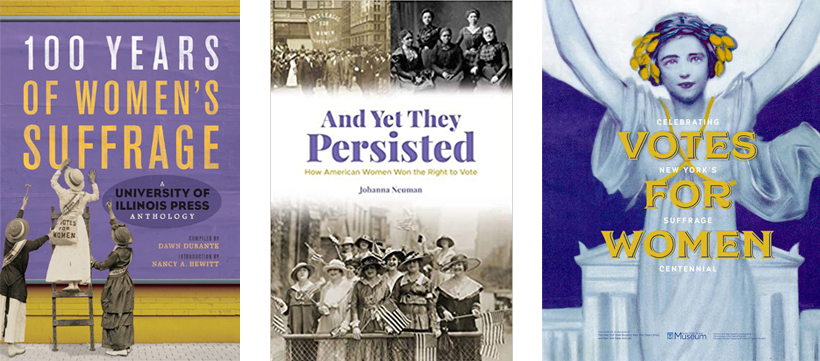100 Years of Amendment XIX

"The right of citizens of the United States to vote shall not be denied or abridged by the United States or by any State on account of sex. Congress shall have power to enforce this article by appropriate legislation."
The Nineteenth Amendment to the United States Constitution was ratified on August 18th, 1920, ensuring citizens could not be denied the right to vote on the basis of gender. While it seems surprising this was only one hundred years ago, it is also a reminder of how slow progress can be in this country.
Throughout most of American history voting has not been a right guaranteed for all. Before the Revolutionary War many colonies allowed women the right to vote. After 1776, with the exception of New Jersey, all state constitutions denied women the right to vote. New Jersey later rescinded the right for property-owning women to vote in 1807.
Women's suffrage played some part in the American conscience following 1776, but the movement's efforts became more organized in the 1860s, after the Civil War. Over 50 years later, on June 4th, 1919, Congress proposed the Nineteenth Amendment. During the next year, the minimum requirement of thirty six states to ratify the Amendment was reached. Tennessee was the final state to support the amendment ratification on August 18th, 1920. While the remaining 12 states at that time did not need to ratify the Nineteenth Amendment, they all eventually did, with Mississippi being the final state to do so in 1984.
The right to vote is often a controversial topic and the history of voting rights in America is best viewed with an intersectional lens. Originally a member of the American Equal Rights Association (AERA), Susan B. Anthony, probably the most well-known American suffragette, later split from the group to form the National Woman Suffrage Association (NWSA) with her longtime compatriot, Elizabeth Cady Stanton. This split came about after Anthony learned the AERA wanted to grant the right to vote to blacks before turning their attention to women's rights. Anthony and Stanton believed black men should not receive the right to vote before white women. Both the AERA and the NWSA campaigned for universal suffrage, but the NWSA prioritized women's rights.
The history of black suffragists, both men and women, is rarely taught in schools, but their efforts to gain more equal rights were just as important to the ratification of both the Fifteenth and Nineteenth Amendments between 1870 and 1920. The National Association of Colored Women, formed in 1896, with the motto "Lift as we climb," sought to gain civil rights, social welfare for black women and children, voting rights and increased education in many states prior to the passing of the nineteenth amendment. The struggle for increased civil rights and equal voting rights continued until the Civil Rights Act of 1964 and the Voting Act of 1965 were passed. In many ways the struggles of all colored people continue to this day. Who should be allowed to vote is still an issue being argued in our current era. Many states seek to complicate or deny citizens the right to vote with laws that disproportionately affect lower income communities and communities of color.
While the Nineteenth Amendment ensured women the right to vote, there are still many ways people are treated unequally based on their gender. White females generally make less than their white male counterparts in the same or similar jobs. Women of color make even less for the same jobs as Caucasians. Introduced in the 1970s, the Equal Rights Amendment sought to guarantee everyone would be treated equally under the law regardless of gender and wanted to end legal distinctions between men and women in matters such as employment and property ownership. This proposed Amendment has still not been ratified nearly fifty years later.
Read More
The ratification of the Nineteenth Amendment is a landmark achievement in American history as it helped to create a more equitable society, but there is still a long way to go before there is true equality in America. To celebrate the Centennial of Amendment XIX, Pepperdine Libraries has curated a list of ebooks about women's rights, the history of the suffrage movement in America and the ratification of the 19th amendment. A sampling of the covers for many of the books found on the full curated list is available below. Be sure to check out our curated book display of selected ebook titles on topics relating to women's voting history and rights, available at https://tinyurl.com/19thamendmentbooklist.
Join Us in Celebrating the Centennial
To learn more about women's suffrage, join Pepperdine Libraries for an online lecture by author Rebecca Boggs Roberts on Wednesday, August 19, 2020 from 4:30 -5:30 PM PDT in celebration of the centennial of the 19th Amendment's ratification. Roberts is an author, curator, and has been a host of NPR's Morning Edition. Her book, The Suffragist Playbook: Your Guide to Changing the World, is due out in September. The talk is free and will be hosted on Zoom. Visit our event calendar listing for more information and the Zoom link. Everyone is welcome to attend.